
Intermarium was a post-World War I geopolitical plan conceived by Józef Piłsudski to unite former Polish–Lithuanian Commonwealth lands within a single polity. The plan went through several iterations, some of which anticipated the inclusion of neighboring states. The proposed multinational polity would have incorporated territories lying between the Baltic, Black and Adriatic Seas, hence the name Intermarium.
Anna Wolff-Powęska is a Polish historian and political scientist specialising in Polish-German relations. She was the director of the Western Institute in Poznań from 1990 to 2004. She is one of the foremost authorities on Germany in Poland.
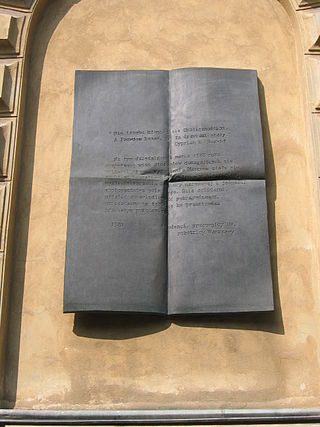
The Polish 1968 political crisis, also known in Poland as March 1968, Students' March, or March events, was a series of major student, intellectual and other protests against the ruling Polish United Workers' Party of the Polish People's Republic. The crisis led to the suppression of student strikes by security forces in all major academic centres across the country and the subsequent repression of the Polish dissident movement. It was also accompanied by mass emigration following an antisemitic campaign waged by the minister of internal affairs, General Mieczysław Moczar, with the approval of First Secretary Władysław Gomułka of the Polish United Workers' Party (PZPR). The protests overlapped with the events of the Prague Spring in neighboring Czechoslovakia – raising new hopes of democratic reforms among the intelligentsia. The Czechoslovak unrest culminated in the Warsaw Pact invasion of Czechoslovakia on 20 August 1968.
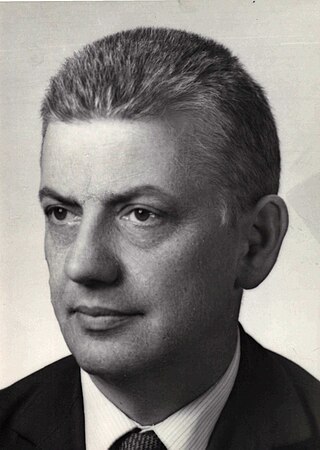
Henryk Zieliński was a Polish historian and professor at the University of Wrocław.

Jerzy Ryszard Szacki was a Polish sociologist and historian of ideas. From 1973 he was a professor at the University of Warsaw, and in 1991 became a member of the Polish Academy of Sciences. He is considered one of the most prominent representatives of the Warsaw School of the History of Ideas.
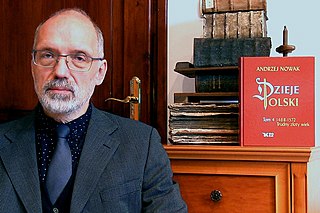
Andrzej Witold Nowak is a Polish historian and opinion journalist.
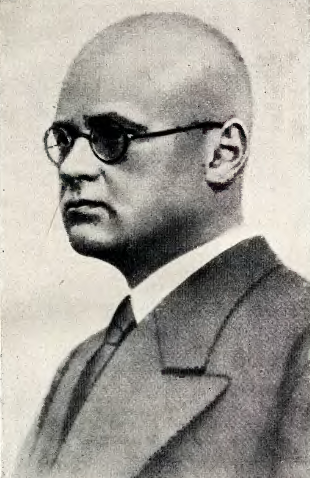
Józef Feldman was a Polish historian of Jewish ethnicity, professor of the Jagiellonian University in Kraków and a member of the Polish Academy of Learning.
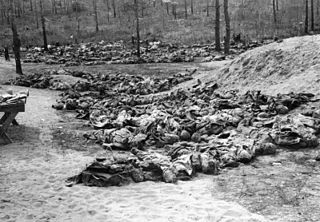
In the aftermath of the German and Soviet invasion of Poland, which took place in September 1939, the territory of Poland was divided in half between Nazi Germany and the Soviet Union. The Soviets had ceased to recognise the Polish state at the start of the invasion. Since 1939 German and Soviet officials coordinated their Poland-related policies and repressive actions. For nearly two years following the invasion, the two occupiers continued to discuss bilateral plans for dealing with the Polish resistance during Gestapo-NKVD Conferences until Germany's Operation Barbarossa against the Soviet Union, in June 1941.
Roman Wapiński was a Polish historian, lecturer at the University of Gdańsk. He specialized in the history of the Second Polish Republic and right-wing National Democracy political camp, being the foremost historian of National Democracy. Wapiński was considered one of the foremost Polish historians.

Piotr Gontarczyk is a Polish historian with a doctorate in history and political science.

Czesław Wycech (1899–1977) was a Polish activist, politician and historian. He was a member of the Polish peasant's parties: the Polish People's Party "Wyzwolenie", the People's Party, the Polish People's Party, and the United People's Party. During World War II he was a member of the Polish Underground State, responsible for organizing underground education. He was the Minister of Education in the Council of National Unity (1945–1947). Within the People's Republic of Poland, he was a member of the Polish parliament (Sejm) and also held other governmental posts.

Piotr Marian Massonius was a Polish philosopher and teacher who was born into in the Russian Empire.

Andrzej Friszke is a Polish historian and lecturer. He specializes in the history of communist Poland and the democratic opposition to the communist regime.

Adam Wielomski is a professor at the University of Natural Sciences and Humanities in Siedlce, where he teaches in the Institute of Social Sciences and Security of the Faculty of Humanities. Wielomski is the author and co-author of several books on Spanish and French counter-revolutionary political thought. He is also the editor-in-chief of quarterly journal Pro Fide Rege et Lege and a columnist for Najwyższy Czas!.
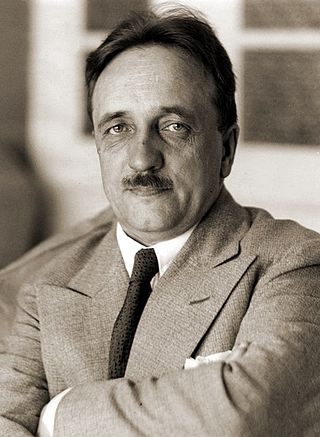
Feliks Młynarski was a Polish banker, philosopher and economist.

The princely houses of Poland and Lithuania differed from other princely houses in Europe. Most importantly, Polish nobility (szlachta) could not be granted nobility titles by the Polish kings in the Polish-Lithuanian Commonwealth. Therefore, the title of prince either dated to the times before the Union of Lublin, which created the Commonwealth in 1569, or was granted to some nobles by foreign kings. Due to the longstanding history of common statehood, some noble families often described as "Polish" actually originated in Grand Duchy of Lithuania and are of Lithuanian or Ruthenian descent. Some houses are more correctly described as being of Polish-Lithuanian Commonwealth.
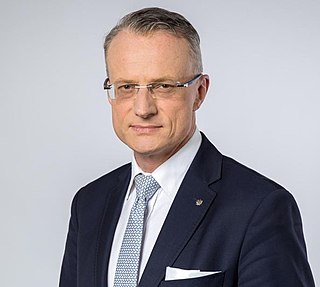
Marek Grzegorz Magierowski is a Polish journalist, columnist, politician and diplomat; since 2021 ambassador to the United States and from 2018 to 2021 ambassador to Israel.

Jan Krzysztof Żaryn is a Polish historian, professor and politician, who was a Senator in the Senate of Poland from 2015 to 2019.
Educational and Scientific Society The Center for Political Thought is a conservative think tank – an association with the status of a public benefit organisation, founded in Kraków in 1992.

Adam Janusz Leszczyński is a Polish historian and journalist, associate professor at the Institute for Political Studies of the Polish Academy of Sciences.

















